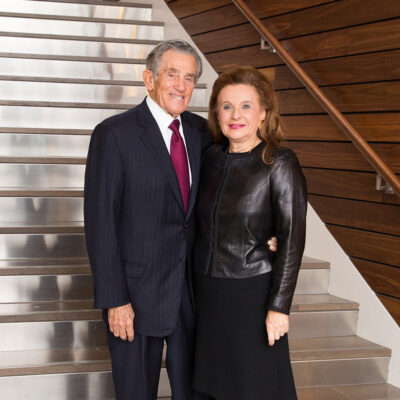An extraordinary gift of $10 million from Robert and Renée Belfer and family will support innovative immuno-oncology research at Dana-Farber Cancer Institute designed to predict responses to cancer immunotherapy and improve patient outcomes. The gift brings the Belfer Family’s longtime giving to Dana-Farber to more than $35 million, and provides powerful momentum to a key strategic priority of The Dana-Farber Campaign.
Specifically, the gift will support combining patient-derived organotypic spheroids (PDOTs)—also known as “tumor-on-a-chip”—developed at the Robert and Renée Belfer Center for Applied Cancer Science, with new Dana-Farber-developed mass spectrometry technology. PDOTs are used to predict how patients respond to existing immunotherapy cancer treatments.
“It is our hope that this gift will result in more research breakthroughs, a larger number of clinical trials, and improved patient care for the benefit of people here and around the world so they can live longer, healthier lives,” said Laurence Belfer, Robert and Renée’s son, who oversees much of the family’s philanthropic activity.
The Belfer Center team led by Pasi Jänne, MD, PhD; David Barbie, MD, and Cloud Paweletz, PhD, will launch an immuno-oncology project using data-independent acquisition mass spectrometry (DIA-MS). This technology, pioneered by Dana-Farber’s Ellis Reinherz, MD, and his team, pulls small proteins known as neoantigen peptides directly off tumors and determines their identity. Once identified, these small proteins, which are found only on tumor cells, can be used to generate either personalized T cells or vaccines that kill cancer cells. With this gift, the Belfer Center will industrialize this approach and systematically roll out the capability for Dana-Farber investigators and industry partners.
“Our approach will have an immediate impact on patients by rapidly accelerating the detection of robust neoantigens for immune cell targeting,” said Barbie, associate director of the Belfer Center.
Neoantigen peptides form within tumors, but travel to the surface of tumor cells, where they provide a beacon for T cells to eliminate them. By identifying these neoantigen peptides, researchers can generate precise T cells in the lab as a therapy for these tumors. The Belfer Center team will then investigate cancer cell destruction using the PDOTs platform, analyze cells’ underlying biology, and test their findings in research models.
“This gift will enable our scientists to look to the future of immuno-oncology and, with key industry partners, develop the next-generation of personalized immunotherapies for a range of cancers,” said Jänne, director of the Belfer Center, the Carole M. and Philip L. Lowe Center for Thoracic Oncology, and the Chen-Huang Center for EGFR Mutant Lung Cancers, as well as the David M. Livingston, MD, Chair at Dana-Farber.
Robert and Renée Belfer have a long history of giving to Dana-Farber. A $10 million gift in 2006 established the Robert and Renée Belfer Center for Applied Cancer Science, which translates innovative oncology research into cancer treatments through strategic collaborations with pharmaceutical and biotechnology companies. They also support Dana-Farber’s Palm Beach activities, co-chairing the 2015 Breakfast with the Doctors event. Robert Belfer served as an Institute Trustee from 2011 to 2020.
“The Belfer Family’s commitment to Dana-Farber over the years has been remarkable and continues with this magnificent gift,” said Laurie H. Glimcher, MD, Dana-Farber president and CEO; the Richard and Susan Smith Professor of Medicine; and a world-renowned immuno-oncologist. “The resulting data from this research will lead to more clinical trials to treat more patients, expanding the breakthrough of immunotherapy to cancer patients everywhere.”
For more stories about the impact of philanthropy at Dana-Farber, please visit DanaFarberImpact.org.



